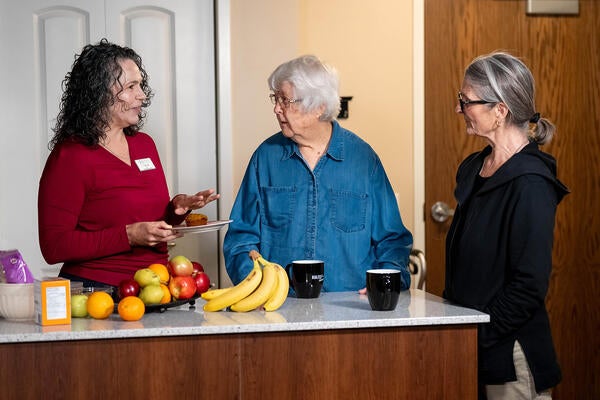
Waterloo researcher awarded Michael J. Fox Foundation grant
Dr. Kaylena Ehgoetz Martens receives a portion of $1.35 million USD for research in Parkinson’s freezing of gait symptom

Dr. Kaylena Ehgoetz Martens receives a portion of $1.35 million USD for research in Parkinson’s freezing of gait symptom
By Faculty of Health Dr. Kaylena Ehgoetz Martens, a researcher in Kinesiology and Health Sciences, is part of an international team that received $1.35 million USD from the Michael J. Fox Foundation (MJFF) for a joint project on freezing of gait (FOG), a disabling symptom of Parkinson's that currently lacks treatment options and gold-standard assessment tools.
Dr. Kaylena Ehgoetz Martens, a researcher in Kinesiology and Health Sciences, is part of an international team that received $1.35 million USD from the Michael J. Fox Foundation (MJFF) for a joint project on freezing of gait (FOG), a disabling symptom of Parkinson's that currently lacks treatment options and gold-standard assessment tools.
The experts met in Jerusalem for a summit in March earlier this year, bridging their international expertise to develop a clinical standard and harmonized definition of FOG. Ehgoetz Martens’ portion is $180,000 USD over two years.
“I have dedicated a large part of my research career to FOG,” says Ehgoetz Martens. “I am thrilled to advance this work, which is focused on clinical outcome assessment to accelerate our ability to test future treatments. If we don't have a reliable way to assess FOG severity, it’s tough to measure improvements from therapies.”
There is currently no clinical gold standard in assessing the severity of a patient’s FOG.
“Freezing of gait is variable and inconsistent. Sometimes at the neurologist’s office, it won't be present during the assessment, but the patient will go home and experience the freezing again,” explains Ehgoetz Martens. “We need a better test battery to capture FOG in the clinic.”
Some clinicians may ask the patient to walk while talking, or to turn on the spot. Many others rely on the patient’s self-report.
“Because nobody uses the same assessment, the outcomes are all over the place,” says Ehgoetz Martens.
The funding from MJFF will help Ehgoetz Martens and the international team of FOG experts to develop a protocol that is consistent and standardized, which clearly outlines what mild, moderate and severe freezing is.
“I had a grandparent with Parkinson’s, so as an undergrad, I opted to volunteer at a Parkinson’s research rehabilitation and movement centre,” says Ehgoetz Martens. “I met many people who faced the mobility challenges that FOG causes. I was both fascinated by this peculiar phenomenon and horrified by its impact on falls and quality of life. It was clear to me that I wanted to help improve FOG for these people to help restore mobility and reduce the stress the FOG brings out for these people.”
Ehgoetz Martens runs the Neurocognition and Mobility Lab at Waterloo, which dedicates research to understanding how cognition and emotion influence gait. She is the only Canadian researcher on the team of experts granted this funding.
“We have some of the best FOG experts in the world getting together to advance the field and I’m excited to be a part of it,” says Ehgoetz Martens.

Read more
The Government of Canada announces funding to support research in food policies and medical devices

Read more
How machine learning empowers collaboration between computer science, math and medical research

Read more
Dr. Heather Keller discusses the need to transform mealtimes in Canada’s long-term care homes from a service to a meaningful form of care
The University of Waterloo acknowledges that much of our work takes place on the traditional territory of the Neutral, Anishinaabeg, and Haudenosaunee peoples. Our main campus is situated on the Haldimand Tract, the land granted to the Six Nations that includes six miles on each side of the Grand River. Our active work toward reconciliation takes place across our campuses through research, learning, teaching, and community building, and is co-ordinated within the Office of Indigenous Relations.